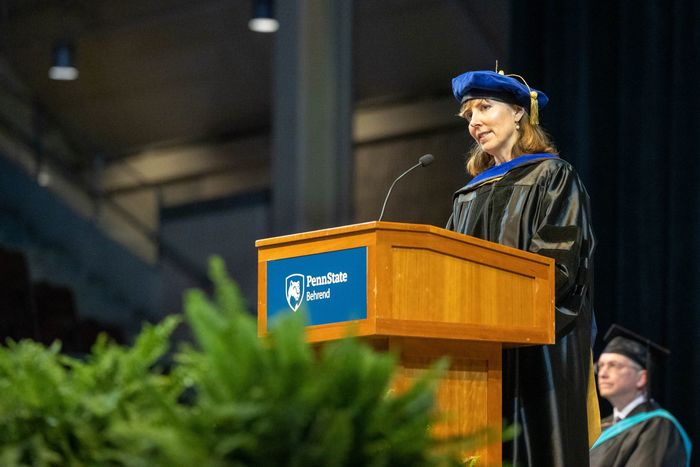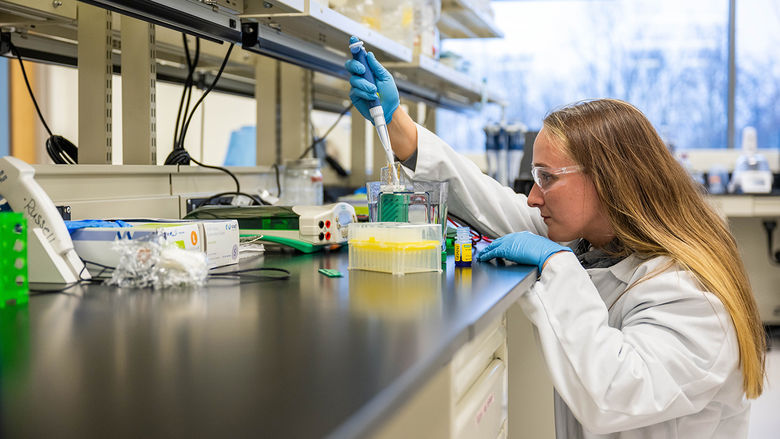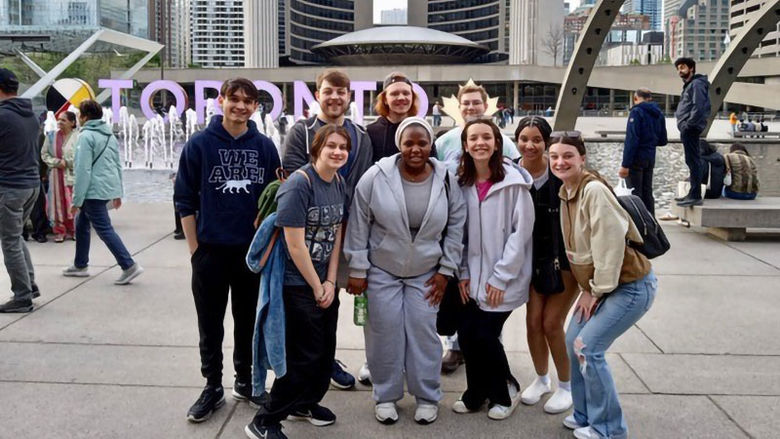

This dialog contains the full navigation menu for this site.

Penn State Behrend awarded 660 degrees at the college’s spring commencement ceremony. The May 6 program, which was held at Erie Insurance Arena, also honored the college’s 2020 graduates, whose commencement events were virtual, due to the pandemic.
“Commencement is the most anticipated event of the academic year – one the entire Behrend community looks forward to as much as graduates and families do,” Chancellor Ralph Ford said. “It was important that we celebrate this milestone with those whose in-person commencement was interrupted by a time of social distancing and isolation.”
Charisse Nixon, a professor of psychology, gave the commencement address. Her remarks, which focused on resilience, appear below, in their entirety:
These past two years, you have lived through a pandemic, adjusted to courses online, then back to in-person, and then, for some of you, back to a mixture of both online and in-person classes. You have had to navigate a new culture amidst masked faces and social distancing. During that time, we lost some control over with whom, and where, we spend our time.
But now, we have the opportunity to intentionally rebuild that culture. You get to decide, for the most part, who you want to spend your time with, and where. Choice is a gift. Don’t take it lightly.
You have grown in unexpected ways during this time, and, perhaps, even surprised yourself. You have developed resilience.
What exactly is resilience? We tend to think of resilience as some secret ingredient – as one thing, and if we only had that one thing, then … you fill in the blank. But, according to experts at the University of Minnesota, it’s not ONE thing, and it’s not some silver bullet. Instead, it’s many things: ordinary things – things that help us to adapt well during stressful situations. Things we can develop and grow. Professor Ann Masten calls these qualities “ordinary magic.” And the good news is that we all have the capacity to grow resilience.
Well, how do you grow your resilience?

Charisse Nixon, a professor of psychology, gave the commencement address at Penn State Behrend's spring 2022 commencement ceremony. Her remarks focused on student resilience.
According to researchers like Carol Dweck, David Yeager and a host of others, your mindset – the beliefs, attitudes and perceptions about yourselves and others – matters. A recent article in UC Berkely’s Greater Good Science Center highlighted three mindset shifts that can help as you walk through new transitions in your life. These three shifts are referred to as your GPS mindset. This GPS can also be thought of as building our pathway to resilience. I like this analogy of a GPS, because a GPS helps us to get where we need to go – what route to take.
Similarly, when you leave here, you are looking for direction: For ways to successfully navigate your first job out of college, or graduate school, or a host of other opportunities. But unlike the GPS on our phone or digital device, which just shows up when we ask it, we have to build this GPS before we use it.
Let’s take a closer look at our GPS. It is an acronym.
G stands for “growth.” Grow your perspective. According to the experts, a key way to grow your resilience is to embrace your mistakes and learn from your experiences. Of course, celebrate your successes. Celebrate everything this day has to offer you, but also celebrate your failures. Develop your growth mindset by challenging yourself to try new things – things that don’t come easy to you. Disappointments are an inevitable part of our journey, but it is through those experiences that we can really grow. Continue to work hard and seek out new ways of doing things. View obstacles as challenges and opportunities for growth.
Decide to make every day meaningful, no matter what happens. You get to decide how to interpret the situations in your life – things that will happen as you go through your journey. Some things will be out of your control, but you still have the opportunity to control how you respond. Resilience is your response.
Remember, you get to write your own narrative. You get to decide how to interpret those events.
According to researchers, one way to grow your perspective is by practicing the discipline of reflection. For example, it’s important to reflect upon all the people that helped you get here today. Consider daily journaling, prayer, meditation – think back to the challenges you have had to overcome to be here today. Rediscover how you chose to effectively respond during these last few years. Reminding yourself where you have been can help you see a clearer path forward.
The P in your GPS stands for "purpose."
Well, what is purpose? According to William Damon at Stanford University, purpose is driven by passion, but it’s not just about your passion that you have developed over the past four years at Behrend. Developing your purpose also includes service to others, for it is only in serving others that we truly find ourselves. Use the gifts you have learned here to serve others, whether that is in the humanities, social sciences, engineering, the arts, the medical fields, business, education, nursing or a myriad of other fields.
Use your gifts in everyday experiences. As the author Jennifer Rothschild reminds us, the only one who can effectively share your gifts is you. Focus on what you can contribute to our world; each of you has a unique place in this world, that only you can fill.
People often say, “find your purpose.” But, do we really “find” our purpose? No! Recent research has shown that we don’t find our purpose. We build our purpose. That one word makes a big difference. And we build our purpose by helping others, by volunteering, by giving to others regularly; and if we do that, not only will we be more psychologically healthy, but we will also have a lower risk of hypertension and live longer.
Harvard Business Review recently published an article about the importance of actively building our purpose. In that article, researchers also acknowledge that most of us will have multiple sources of purpose in our lives – in our work, in our families and in our communities. This takes the pressure off finding that single thing to give our lives meaning.
The S in your GPS stands for social – "social connections."
We are all hard-wired for connection. Continue to develop and nurture your social relationships, but remember, they take time. Challenge yourself to get out of your comfort zone and establish new relationships. The importance of social support has been documented for decades now. Ask for help!
According to the research, a key component of resilience is being able to reach out to others for support. You are all going to leave here tonight and start your next chapter – and it is going to feel different. You are going to experience both mountaintops and valleys. Research shows that when we start something new, we often feel like we are the only ones going through that experience – the only ones struggling to make new friends, to learn new skills, to make solid connections, to find our place. But that’s not true. Be patient with yourself. You are not alone.
We know from decades of research that positive relationships are a core ingredient to developing resilience. But relationships don’t just happen. I would like to leave you with three practical strategies to continue developing your resilience and building your own GPS. They may sound a little counter-cultural, but, according to the research, they work to build resilience.
The first strategy is: Be willing to be vulnerable. In other words, we need to show our “cracks.” Our vulnerabilities are an important part of who we are. By showing our vulnerabilities, we open up the potential for new social relationships. In studying vulnerability, I learned a new word: kintsugi. This is a Japanese word that refers to the art of fixing cracked pottery or mending areas that are broken. The word actually means “golden repair.” Instead of hiding the cracks, this technique includes rejoining pieces with lacquer mixed with powdered gold, silver or platinum. When put back together, the piece of pottery looks more beautiful than ever, while still owning its broken pieces. If we are really honest, we would acknowledge that we are all broken. And, as I have heard it said many times before, it’s only through the cracks that the light gets in.
The second strategy to build resilience leads to greater psychological and physical well-being, provides more meaning in life, increases our generosity, empathy and our gratitude. The second strategy is to practice humility. Too often our culture thinks of humility as a weakness, but in reality, humility is a strength. Humility is merely having a relatively accurate view of yourself: You understand your weaknesses and your strengths. But most importantly, humility is an orientation toward others. As C.S. Lewis tells us, “Humility is not thinking less of yourself, but thinking of yourself less often.” When we lead with humility, we understand that everyone has something to teach us. Learn to ask for help. I’ve often heard it said: “Pride tears things apart, but humility heals and repairs.” I encourage you to chase humility as you begin your next chapter.
The last strategy I would like to leave you with to build your resilience and your own GPS is to remain hopeful. Hope is an important part of resilience. Hope is not an emotion. It’s not a wish. Instead, hope is an intentional way of thinking. Hope is knowing you can tolerate disappointment and try again. Hope is believing that you accomplish great things, even if you can’t see it. Hope is goal-directed and purposeful. Hope is a mindset that drives resilient behavior, that can be learned and developed over time. Hope is a choice. It’s your choice. According to the science, hope is one of the best predictors of our wellbeing, and it is particularly important during transitions in our lives. It is the foundation of our resilience. Looking through the lens of hope is a game-changer.
As I close today, I want to remind each of you sitting here that you are unique. You, and you alone, can only affect the world in a particular way with your talents and your gifts. What you choose to do with your gifts from here on out will begin your legacy.
Congratulations!

Penn State Behrend awarded 660 degrees at the college's spring commencement ceremony. The May 6 program, held at Erie Insurance Arena, also honored Behrend's 2020 graduates, whose commencement events were virtual, due to the pandemic.


